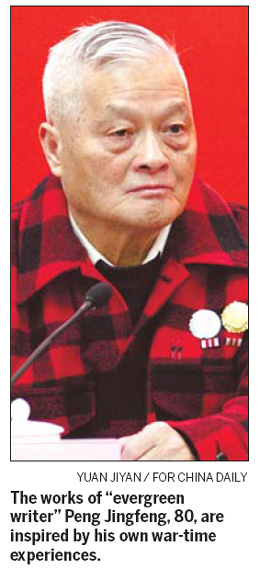How the southwest was taken
By GUO SHUHAN (China Daily)
Updated: 2010-04-16 09:57
 |
Large Medium Small |

At 82, veteran author Peng Jingfeng has again impressed critics with a heavy work that stems from his own experience in the turbulent war years.
At Tuesday's forum on Peng's Liberating the Great Southwest (Jiefang Daxinan, Yunnan Art Press, 2009) held at the Chinese Writers' Association (CWA), Tie Ning, chairperson of CWA, said the author's familiarity with historical facts enables him to vividly illustrate a complicated event.
"Like a commander, Peng chronicles happenings with ease," says Tie, also a well-acclaimed writer.
The book features more than 550,000 words and some 620 people, painting a panoptic picture of the liberation of the "Great Southwest", i.e. Yunnan, Guizhou and Sichuan provinces and the Tibet autonomous region. Before the founding of New China in 1949, the Great Southwest was the last stronghold of the Kuomintang and witnessed some of the fiercest battles in the mountain regions.
Peng spent 10 years drafting the story and amending it 10 times over. The octogenarian says the non-fiction work is a present for the country on its 60th birthday.
A native of Pingxiang, Jiangxi province, Peng joined the People's Liberation Army at 20 in 1949. He followed commanders Liu Bocheng and Deng Xiaoping into the Great Southwest.
In the 1950s, the self-taught author, who didn't finish junior high school, rose to fame as one of the representatives of frontier literature. Most of his works have focused on warfare across the border and the lives of local ethnic groups.
Peng co-wrote two screenplays, Skirmishes on the Border (Bianzhai Fenghuo) and Lusheng Love (Lusheng Liange), which were turned into films in 1957. His novel Pear Blossom Along the Post Routes (Yilu Lihua) is taught in middle school.
To record the grand event as authentically as possible, Peng interviewed many soldiers and generals who experienced the war and dug deep into archives.
While military or war history is a favorite with young writers in recent years, literary critic Lei Da says Peng, being a witness, has an edge in terms of war analysis.
"His simple but accurate narrative style has a penetrating power, which can probe deeply into the essence," Lei says.
Zheng Ming, chairman of the Yunan Literary Federation, says the book will be quoted by later generations.
Having produced his 29th book, Peng, dubbed an "evergreen writer", is looking forward to his 30th and more. His next novels would be set in Yunnan and his hometown Jiangxi.